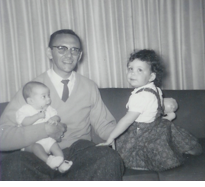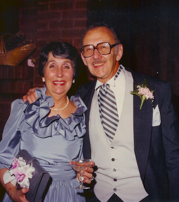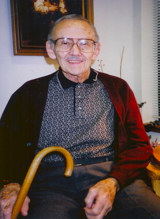Harry Abraham Karpilow – husband, father, teacher, friend – would have turned 100 today. He died in 2004.
I think of him often, especially this year,  as I celebrate a landmark birthday. Something about the life-clock striking 65 has stirred me to reflect back, and look ahead.
as I celebrate a landmark birthday. Something about the life-clock striking 65 has stirred me to reflect back, and look ahead.
My dad was a good father.
For his generation, he was especially present in our lives. We told jokes and talked politics at family dinners. He went dancing with my mother and had a monthly poker game with his buddies. He built a family cabin.
I remember laughing at the dining table, singing “Mrs. Murphy” in the car.
And there’s the things my father didn’t do: He didn’t drink or swear too much. There were no sexist jokes or embarrassing affairs. No Playboys on the coffee table.
I knew he was there to protect and care for us.
And he mowed the lawn.
He also believed in being responsible. He paid his bills on time. He voted. He took pride in his work, and like most teachers, dedicated 120 percent. For over a decade, he was the primary support, and eventually front-line caretaker, for his widowed mother.
As I’ve sheltered-in over the past months, I’ve wondered why I’m fortunate to be relatively free from financial worry. I’ve spent time (and don’t we all seem to have more time?) analyzing why.
Many of the reasons go back to my birth family.
My parents had expectations, mostly unspoken, that I would go to college, as they had – though their post-Depression, post-World War II trek was more circuitous than mine.
Because I went to college, which my parents mostly paid for, and then on to graduate school, I was able to make a decent living, buy a home, and save for retirement.
My parents also left an inheritance to my brother and myself. Not huge – but a cushion for emergencies, a buffer against anxiety.
For 50 years, my parents modeled a working marriage: that couples love – and fight. How sometimes you persevere to stay together. And one benefit of that tenacity is greater financial security.
(And someone to play cards with while you shelter in.)
All this adds up to a family portrait of generational support. My parents’ expectations about education and hard work, lessons about keeping-on in a marriage, and the financial resources they passed on, contribute to my present financial security.
Then there are the underlying institutional supports that propelled my family’s finances forward – like the GI Bill, public education, public employee pensions and medical care, social security, even mortgage interest tax deductions. And going back further, immigration laws that permitted my paternal grandparents to emigrate from Russia.
And though my parents came from poor families and lost their bread-winning fathers when they were teens, they were both white, a ticket, though not a guarantee, to wealth-building and opportunity.
What they didn’t face was discrimination in education, employment, banking, medical care, and housing based on the color of their skin.
The road to my parents’ future may not have been paved in gold, but it wasn’t an unpaved street with detours and stop signs.
*****
My father wasn’t perfect.
He was often impatient, and had a temper. Like many of his peers, he had traditional views about the role of women, the underlying reason he and I would occasionally clash. But love and family loyalty always brought us back together.
I remember my mother and father arguing once, and hearing him yell, “You don’t have to work, I can support the family.”
But that clearly wasn’t true – on a teacher’s wages.
Even in the 1960s and 70s, it took two middle-class paychecks to buy a house, send your kids to college, and save for retirement. And besides, he was married to a woman, my mother, who wanted to work, travel, and have her own identity.
*****
I’ve wondered what my father, a New Deal Democrat, would have thought about our current president.
Aside from differences in policy positions, a main complaint would have been how the President treats people: My dad’s core sense of decency would have been violated.
Like many men of his generation, being a “good man” was about working hard, taking care of your family, respecting women, behaving with propriety in public.
Good men didn’t default on loans, brag about sexual conquests, use racial slurs and innuendo, go unprepared to work. By my father’s code of honor, good men treated colleagues and waiters, bus drivers and store clerks with respect.
When I was young, my father taught me how to shake hands. I remember him saying: “No, that’s like a vise. No, that’s too wimpy. You just have to be firm.”
What he was really teaching me was how to greet people, all people. I was expected to always say “hello” or nod in recognition.
It wasn’t so much about the salutation. It was about respect.
*****
My father’s final years weren’t easy. A physical man, he had hoped for a retirement filled with golf, bowling, dancing with my mother. And those monthly poker games.
But heart issues and hip replacements slowed him down.
One year, the bowling ball got shelved in the garage, the golf clubs stashed in a corner. Parties with friends continued, with less dancing, more off-key singing.
Service to others was a theme of my father’s life – five years in the Army during World War II, taking care of his mother, working as a teacher, parenting his children, and then, when my mother had a massive stroke, caring for his wife.
His world got smaller. He and my mom moved to a retirement community to get help with meals and cleaning. Harry kept busy, becoming Baywood Court’s unofficial librarian.
My brother would call every Sunday. They’d talk about work, the grandkids. They’d place bets on sports teams.
I also “checked in” by phone, and visited on weekends. At a certain point my car became the shuttle to Kaiser.
When my father died, I was struck by the outpouring of love, not only from old colleagues, friends and other seniors at Baywood. But also from young people who worked in the dining hall and staffed the front desk.
It was clear Harry had often stopped to chat. He’d asked questions about school, or gave a nod while shuffling by with his walker.
On this day, a century from his birth, I write to honor him and thank him for teaching me about respect, how to work hard, how to persevere.
His final gift to us, among so many: He left the way he lived. No complaints, and courteous.
Harry Abraham Karpilow – a good man, a beloved father.
